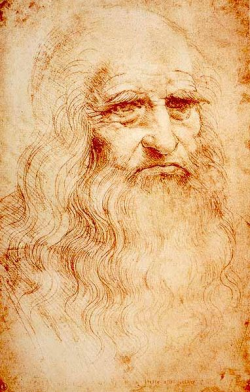Leonardo, Aristotle and the Human Machine
This is part 3 of a series. ( Part 1 / Part 2 /)
In my last post I introduced a quote by Aristotle where he expressed his opinion about the origin of thought in the human body. The re-occurring thing that seems to crop up is a reference to the “gut” as a place where intelligence seems to have some root.
I mentioned the findings in 1996, some 2300 years later, of a “gut brain” in humans by cell biologist Dr. Michael Gershon.

Today I’d like to take you back in history once more, about 450 years to be exact, and introduce to you to a guy who also had something radical to say about the human body.
The Human Machine
The year is 1558 and Leonardo di ser Piero da Vinci works diligently away in his studio in Milan Italy.
Oh, you’ve heard of him?
Not surprising, since today he is regarded to be one of the greatest painters of all time and perhaps the most diversely talented person ever to have lived. He explored the fields of science, mathematics, engineering, inventing, and anatomy just to name a few.
Leonardo was a man of conviction and, even though he lived in a time when the church was the real power in society, when he had an opinion he gave it voice. He once declared that the human physiology, the “human machine” as he called it, could be improved. That got him into some serious hot water with the church brass. He was given an order to keep such comments to himself… or else!
He may have toned it down a bit but he moved forward anyway by making a few sketches in an attempt to try a few ideas out. One at least looks remarkably similar to today’s hang glider. Poor Leonardo, although he was right he was wrong. He concentrated on physical add-ons not inner-skills. What seemed to have escaped his enormous genius was simply the nature of the improvement that could potentially be made.
He may have been close about his observation of the physical body as a machine though. Others have since come to reference it in similar ways. In fact, how the modern day computer ‘thinks’ could qualify, however loosely, as another mirror reflection of ourselves as a machine.
But hold on to that thought because, if you can stand it, I’m going to quickly whip you forward again to 1960 and another man skilled in matters of medicine who also had similar impressions about the human body as a machine.
I’ll tell you more about him in my next post.
More power to you my friend.
David Parsons (aka Mobiusman)
